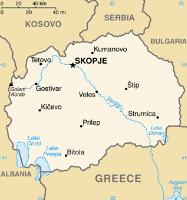SOFIA, Bulgaria -- Still today, whenever there are elections in the small Balkan country of Macedonia, the alarm bells start going off in the EU. Nowadays, however, the principal conflict in Macedonia is not between ethnic Macedonians and the ethnic Albanians who constitute some 25 percent of the population of the country. The violence that broke out on election day earlier this month was the result of a worsening power struggle within the local Albanian community itself. Despite heavy security and the deployment of some 13,000 police, the parliamentary elections on June 1 were yet again marred by irregularities. Armed groups attacked polling stations and threatened voters. In some localities, ballot boxes were stolen and later turned up stuffed with ballots. Several shooting incidents resulted in one dead and several wounded. And all of this in Macedonia: a country that diplomats like to cite as a success story for European Balkan policy. In 2001, the country was on the verge of a civil war as ethnic Albanian guerilla forces began to carry out attacks on police and soldiers. Through the mediation of the EU and the U.S., however, an escalation of the conflict was avoided and Macedonia was preserved as a multiethnic state. Since then, things have been calm in the former Yugoslav republic.
Elections Expose Centrifugal Forces at Work in Macedonia

